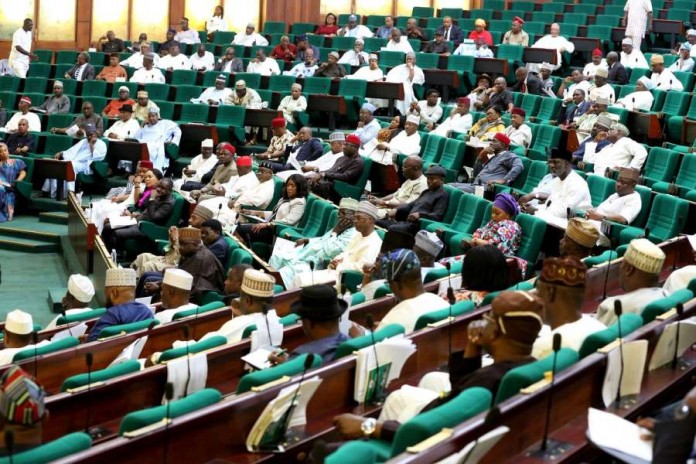The House of Representatives, Wednesday, requested President Muhammdu Buhari to transmit the Tripartite Agreement on new National Minimum Wage to the National Assembly for legislation.
The Lower Chamber, which also expressed concern over ongoing strike embarked upon by the Academic Staff Union of Universities, ASUU, also resolved to set up a joint Senate/House ad-hoc committee to investigate the remote and immediate cause of Tuesday’s industrial action by members of the Parliamentary Staff Association, PASAN, of the National Assembly.
At Wednesday’s plenary, the House equally passed a bill for act to amend the Public Procurement Act, PPA.
The request to the President followed a motion, titled “Call for Legislative Intervention to Maintain Industrial Peace In the Country: Motion Brought Under Matters of Urgent Public Importance”, By Sani Zoro from Jigawa State.
He said there was need for the Parliament to intervene in the matter to find a lasting solution to the crisis.
He said: “The House notes with concern, the on- going strike action by member of Academic Staff Union of Universities (ASUU) which has paralyzed academic activities of most public-owned universities.
“It is worried by the reluctance of the Presidency to transmit the Tripartite Agreement on National Minimum Wage to the National Assembly for legislation.
“The House is alarmed by threats of industrial action by organized labour in the face of the stalemate caused by the failure to facilitate the due process needed for appropriate resolution of the dispute.
“It is disturbed that members of the Parliamentary Staff Association of the National Assembly also picketed our legislative chambers yesterday (Tuesday) to draw attention to their grievances;
“Consistent with National Assembly’s established tradition of intervention that have in the past helped to resolve many labour disputes”.
Zoro added that the move will also help to avert the looming industrial action threatened by organized labour, with the potential of paralyzing the nation’s socio-economic and political activities, and its attendant costs.
Adopting the motion, the House also resolved that the federal government should henceforth display good faith in implementing the age-old agreement mutually reached between it and ASUU, so as to check the union’s incessant strike, adding that it was the only weapon of compelling government to the negotiating table at all times.
The committee, which is yet to be set up, is expected to make immediate recommendations to the two legislative chambers for appropriate action.
Similarly, the House committed into second reading a bill for an Act to amend the Public Procurement Act, Cap. P 44, Laws of the Federation of Nigeria, 2004.
The bill, sponsored by Afe Olowookere and Hon. Karimi Sunday, seeks to make it mandatory for 20% of all public procurement of the Federal Government in a financial year to be awarded to new indigenous companies, indigenous youths and other Nigerians who fall within the economically disadvantaged group.
Speaking on the bill, Femi Gbajabiamila, the leader of the House, said: “This bill does not infringe on any body’s fundamental human rights. At the end of the day, when this bill is fine tuned, it will all go well.
”This bill protects the youth. You are creating allocation of sorts for vulnerable youths and the women. There is a saying that idle hand is the devil’s workshop. It is important that we keep our young able-bodied men and women busy but we must not compromise certain things.”
Meanwhile, Gabriel Onyewuife from Anambra State resigned his membership of All Progressives Grand Alliance, APGA, Wednesday to join the Peoples Democratic Party, PDP.
According a notice of defection read by the speaker, Yakubu Dogara, at plenary, Onyewuife said the crisis in APGA, which had resulted in a faction called Authentic -AAPGA, was his reason for ditching the party.

